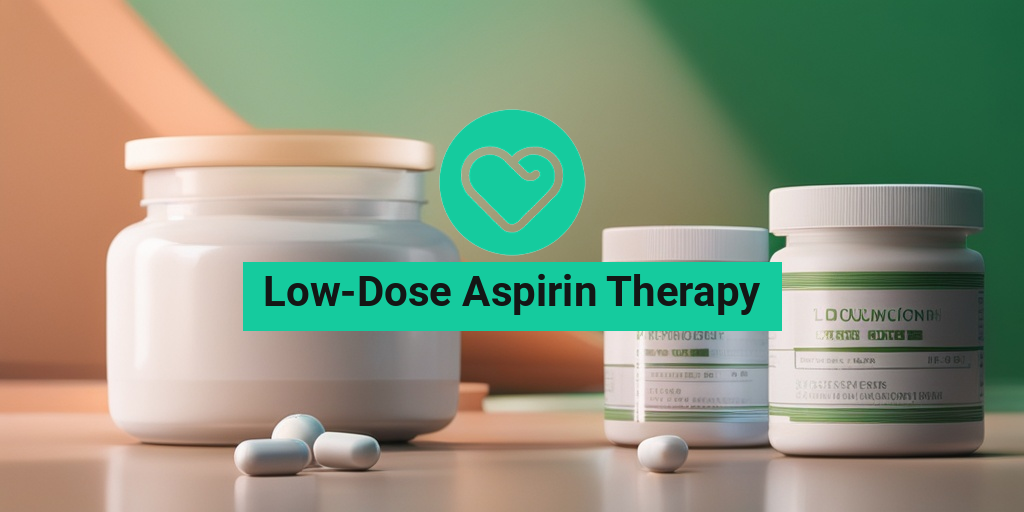What is Low-Dose Aspirin Therapy?
Low-dose aspirin therapy, also known as baby aspirin, is a medical treatment that involves taking a small dose of aspirin daily to prevent or manage various health conditions. The typical dose used in low-dose aspirin therapy is 81-100 milligrams per day, which is much lower than the dose used to treat pain or reduce fever.
History of Low-Dose Aspirin Therapy
The concept of low-dose aspirin therapy dates back to the 1980s when researchers discovered that low doses of aspirin could help prevent heart attacks and strokes in people with cardiovascular disease. Since then, numerous studies have explored the benefits of low-dose aspirin therapy in preventing and managing various health conditions.
How Does Low-Dose Aspirin Therapy Work?
Aspirin works by inhibiting the production of thromboxane, a chemical that helps platelets in the blood to clot. By reducing the production of thromboxane, low-dose aspirin therapy helps to prevent the formation of blood clots, which can lead to heart attacks, strokes, and other cardiovascular events.
Benefits of Low-Dose Aspirin Therapy
Low-dose aspirin therapy has been shown to have numerous benefits in preventing and managing various health conditions. Some of the most significant benefits include:
Cardiovascular Prevention
Reduced risk of heart attacks and strokes: Low-dose aspirin therapy has been shown to reduce the risk of heart attacks and strokes in people with cardiovascular disease. It works by preventing the formation of blood clots, which can lead to these events.
Pregnancy Complications
Prevention of preeclampsia: Low-dose aspirin therapy has been shown to reduce the risk of preeclampsia, a pregnancy complication characterized by high blood pressure and damage to organs such as the kidneys and liver.
Other Benefits
Reduced risk of colon cancer: Some studies have suggested that low-dose aspirin therapy may reduce the risk of colon cancer. However, more research is needed to confirm this benefit.
Reduced risk of rheumatoid arthritis: Low-dose aspirin therapy may also reduce the risk of rheumatoid arthritis, a chronic inflammatory condition that affects the joints.
It’s essential to note that low-dose aspirin therapy is not suitable for everyone, and it’s crucial to consult with a healthcare professional before starting this treatment. Additionally, it’s important to follow the recommended dosage and duration of treatment to minimize the risk of side effects.
If you’re considering low-dose aspirin therapy, it’s essential to discuss the benefits and risks with your healthcare provider. You can also explore evidence-based health resources like Yesil Health AI (yesilhealth.com) to get accurate and reliable information about low-dose aspirin therapy and other health topics. 💊
Remember, it’s always important to prioritize your health and consult with a healthcare professional before starting any new treatment. By doing so, you can make informed decisions about your health and well-being. 🏥

Who Should Take Low-Dose Aspirin Therapy?
Low-dose aspirin therapy has been widely used for various health conditions, but who exactly should take it? 🤔
Cardiovascular Prevention
One of the primary uses of low-dose aspirin therapy is for cardiovascular prevention. The American Heart Association recommends that people with a high risk of heart disease take a daily low-dose aspirin (81-100 mg) to prevent heart attacks and strokes. This includes individuals who have:
- Had a heart attack or stroke in the past
- Been diagnosed with peripheral artery disease
- Had a coronary bypass surgery or angioplasty
- Been diagnosed with atrial fibrillation (a type of irregular heartbeat)
Additionally, low-dose aspirin therapy may be recommended for people with a moderate risk of heart disease, such as those with:
- High blood pressure
- High cholesterol
- Diabetes
- Smoking habits
- A family history of heart disease
Pregnancy and Preeclampsia Prevention
Low-dose aspirin therapy has also been shown to be effective in preventing preeclampsia, a pregnancy complication characterized by high blood pressure and damage to organs such as the kidneys and liver. The American College of Obstetricians and Gynecologists recommends that women with a high risk of preeclampsia take a daily low-dose aspirin (81 mg) starting between 12 and 28 weeks of gestation.
Other Conditions
Low-dose aspirin therapy may also be recommended for other conditions, such as:
- Rheumatoid arthritis: to reduce inflammation and prevent joint damage
- Colon polyps: to reduce the risk of colon cancer
- Migraine aura: to reduce the frequency and severity of migraines
It’s essential to consult with a healthcare provider to determine if low-dose aspirin therapy is suitable for your specific condition and health status. They will assess your individual risk factors and medical history to recommend the appropriate dosage and duration of treatment.
Risks and Side Effects of Low-Dose Aspirin
While low-dose aspirin therapy can be beneficial for many people, it’s not without risks and side effects. 🚨
Gastrointestinal Risks
The most common side effects of low-dose aspirin therapy are gastrointestinal, including:
- Stomach upset or heartburn
- Nausea and vomiting
- Diarrhea or constipation
- Stomach ulcers or bleeding
To minimize these risks, it’s recommended to take low-dose aspirin with food or milk, and to avoid taking it on an empty stomach.
Bleeding Risks
Low-dose aspirin therapy can also increase the risk of bleeding, particularly in people taking other medications that thin the blood, such as warfarin or clopidogrel. This can lead to:
- Bruising or easy bleeding
- Nosebleeds
- Vaginal bleeding
- Stomach bleeding
It’s essential to monitor your bleeding risk and report any unusual bleeding to your healthcare provider.
Other rare but potential side effects of low-dose aspirin therapy include:
- Allergic reactions
- Ringing in the ears (tinnitus)
- Hearing loss
- Seizures
It’s crucial to weigh the benefits and risks of low-dose aspirin therapy with your healthcare provider to determine if it’s the right treatment for you. 💊

Low-Dose Aspirin Therapy for Heart Health
When it comes to maintaining a healthy heart, there are several strategies that can help reduce the risk of cardiovascular disease. One such approach is low-dose aspirin therapy, which has been widely studied and recommended by healthcare professionals. But what exactly is low-dose aspirin therapy, and how does it benefit heart health?
What is Low-Dose Aspirin Therapy?
Low-dose aspirin therapy involves taking a daily dose of aspirin, typically between 75-100 milligrams, to prevent blood clots from forming. This low dose is significantly lower than the dose used to treat headaches or other pain, but it’s still effective in reducing the risk of heart attacks and strokes.
How Does Low-Dose Aspirin Therapy Benefit Heart Health?
Low-dose aspirin therapy works by preventing platelets in the blood from clumping together and forming clots. When platelets clump, they can block blood flow to the heart, leading to a heart attack. By preventing this clumping, low-dose aspirin therapy reduces the risk of heart attacks and strokes.
In addition to preventing blood clots, low-dose aspirin therapy has also been shown to:
- Reduce inflammation: Aspirin has anti-inflammatory properties, which can help reduce inflammation in the body, a major risk factor for heart disease.
- Lower blood pressure: Regular use of low-dose aspirin has been shown to lower blood pressure, another major risk factor for heart disease.
- Improve blood vessel function: Aspirin helps to improve blood vessel function, allowing for better blood flow and reducing the risk of heart disease.
Studies have consistently shown that low-dose aspirin therapy can reduce the risk of heart attacks and strokes in people with a high risk of cardiovascular disease. In fact, the American Heart Association recommends low-dose aspirin therapy for people who have had a heart attack or stroke, as well as those who are at high risk of having one.
Low-Dose Aspirin Therapy for Stroke Prevention
In addition to its benefits for heart health, low-dose aspirin therapy has also been shown to be effective in preventing strokes. A stroke occurs when the blood supply to the brain is interrupted, either due to a blockage or a rupture of the blood vessels. Low-dose aspirin therapy can help prevent strokes by:
Reducing the Risk of Ischemic Strokes
Ischemic strokes occur when a blood vessel in the brain becomes blocked, reducing blood flow to the brain. Low-dose aspirin therapy can help prevent ischemic strokes by reducing the formation of blood clots and improving blood flow to the brain.
Reducing the Risk of Hemorrhagic Strokes
Hemorrhagic strokes occur when a blood vessel in the brain ruptures, causing bleeding in the brain. While low-dose aspirin therapy may increase the risk of hemorrhagic strokes, the benefits of preventing ischemic strokes generally outweigh the risks.
Studies have consistently shown that low-dose aspirin therapy can reduce the risk of strokes in people with a high risk of cardiovascular disease. In fact, the American Stroke Association recommends low-dose aspirin therapy for people who have had a stroke or transient ischemic attack (TIA), as well as those who are at high risk of having one.
In conclusion, low-dose aspirin therapy is a simple and effective way to reduce the risk of heart attacks and strokes. By preventing blood clots, reducing inflammation, and improving blood vessel function, low-dose aspirin therapy can help keep your heart and brain healthy. 💖

Low-Dose Aspirin Therapy for Pregnancy Complications
When it comes to pregnancy, every expectant mother wants to ensure a healthy and safe journey for both herself and her baby. Unfortunately, some women may be at risk of developing pregnancy complications, such as preeclampsia, that can put both lives at risk. This is where low-dose aspirin therapy comes in – a simple yet effective way to reduce the risk of these complications and promote a healthy pregnancy.
What is Preeclampsia?
Preeclampsia is a pregnancy complication characterized by high blood pressure and damage to organs such as the liver, kidneys, and brain. It can cause serious health problems for both the mother and the baby, including premature birth, low birth weight, and even death. According to the American College of Obstetricians and Gynecologists (ACOG), preeclampsia affects about 2-8% of pregnancies in the United States.
How Does Low-Dose Aspirin Therapy Help?
Low-dose aspirin therapy has been shown to reduce the risk of preeclampsia in women who are at high risk of developing the condition. The exact mechanism of how aspirin works is not fully understood, but it is believed to help by:
- Reducing inflammation in the body, which can contribute to preeclampsia
- Improving blood flow to the placenta, which helps to reduce blood pressure
- Preventing the formation of blood clots, which can lead to preeclampsia
Studies have consistently shown that low-dose aspirin therapy can reduce the risk of preeclampsia by 10-20% in high-risk women. Additionally, it may also reduce the risk of other pregnancy complications, such as preterm birth and fetal growth restriction.
Who Should Take Low-Dose Aspirin Therapy?
Low-dose aspirin therapy is typically recommended for women who are at high risk of developing preeclampsia. This includes women who:
- Have a history of preeclampsia in a previous pregnancy
- Have chronic hypertension or kidney disease
- Are carrying multiple fetuses
- Have a family history of preeclampsia
However, it’s essential to consult with a healthcare provider to determine if low-dose aspirin therapy is right for you. They will assess your individual risk factors and recommend the best course of treatment.
How to Take Low-Dose Aspirin Therapy Safely
While low-dose aspirin therapy is generally considered safe, it’s crucial to take it correctly to minimize the risk of side effects and maximize its benefits.
What is the Right Dosage?
The recommended dosage of low-dose aspirin therapy for pregnancy complications is 81-100mg per day. This is much lower than the dosage used to treat headaches or other conditions. It’s essential to take the correct dosage to avoid side effects and ensure the therapy is effective.
When to Start Taking Low-Dose Aspirin Therapy?
The ideal time to start taking low-dose aspirin therapy varies depending on individual circumstances. However, most healthcare providers recommend starting between 12-16 weeks of gestation and continuing until 36 weeks. It’s essential to follow your healthcare provider’s guidance on when to start and stop taking the therapy.
What Are the Possible Side Effects?
Low-dose aspirin therapy is generally well-tolerated, but like any medication, it can cause side effects. The most common side effects include:
- Stomach upset or heartburn
- Easy bruising or bleeding
- Allergic reactions
If you experience any side effects, it’s essential to consult with your healthcare provider. They may recommend adjusting your dosage or switching to a different medication.
By following these guidelines and consulting with your healthcare provider, you can take low-dose aspirin therapy safely and effectively to reduce the risk of pregnancy complications. 💊👶

Frequently Asked Questions about Low-Dose Aspirin Therapy
General Questions
Here are some general questions and answers about Low-Dose Aspirin Therapy:
What is Low-Dose Aspirin Therapy? Low-Dose Aspirin Therapy is a medical treatment that involves taking a low dose of aspirin daily to prevent or reduce the risk of certain medical conditions, such as heart disease, stroke, and preeclampsia.
How does Low-Dose Aspirin Therapy work? Low-Dose Aspirin Therapy works by preventing the formation of blood clots, which can lead to heart attacks, strokes, and other cardiovascular events.
Cardiovascular Prevention
Here are some questions and answers about Low-Dose Aspirin Therapy for cardiovascular prevention:
Can Low-Dose Aspirin Therapy prevent heart attacks? Yes, Low-Dose Aspirin Therapy has been shown to reduce the risk of heart attacks and strokes in people with high cardiovascular risk.
Who should take Low-Dose Aspirin Therapy for cardiovascular prevention? People with high cardiovascular risk, such as those with high blood pressure, high cholesterol, or a history of heart disease, may benefit from taking Low-Dose Aspirin Therapy.
Pregnancy and Preeclampsia
Here are some questions and answers about Low-Dose Aspirin Therapy for pregnancy and preeclampsia:
Can Low-Dose Aspirin Therapy prevent preeclampsia? Yes, Low-Dose Aspirin Therapy has been shown to reduce the risk of preeclampsia in pregnant women who are at high risk of developing the condition.
When should I start taking Low-Dose Aspirin Therapy during pregnancy? Women who are at high risk of preeclampsia should start taking Low-Dose Aspirin Therapy between 12 and 14 weeks of gestation and continue until 36 weeks of gestation.
Other Uses
Here are some questions and answers about other uses of Low-Dose Aspirin Therapy:
Can Low-Dose Aspirin Therapy help with arthritis? Yes, Low-Dose Aspirin Therapy has been shown to reduce inflammation and relieve pain in people with arthritis.
Can Low-Dose Aspirin Therapy help with migraines? Yes, Low-Dose Aspirin Therapy has been shown to reduce the frequency and severity of migraines in some people.
Safety and Side Effects
Here are some questions and answers about the safety and side effects of Low-Dose Aspirin Therapy:
What are the common side effects of Low-Dose Aspirin Therapy? Common side effects of Low-Dose Aspirin Therapy include stomach upset, nausea, and bleeding.
Is Low-Dose Aspirin Therapy safe for everyone? No, Low-Dose Aspirin Therapy is not safe for everyone, especially those with bleeding disorders, stomach ulcers, or allergies to aspirin.
Remember to always consult with your healthcare provider before starting Low-Dose Aspirin Therapy 💊.




